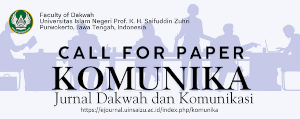MENGASUH, MEMBIMBING, DAN MENYENTUH SISI DALAM ANAK
DOI:
https://doi.org/10.24090/komunika.v4i1.144Keywords:
caring, child, parent, Existential foundation, exemplary, Wise Motivation, LoveAbstract
There were two tendencies patterns that occur in child caring today. First, pattern that tend to the extreme right,which is a very dominate and too forced children. The second pattern tends to extreme left, namely overly excusing. Inbetween these two polar extremes there is a more moderate pattern, namely the ideal. The philosophy is that the caringand guidance tasks are basically inseparable from the duty to understand and interpret human ’inner self’. The task ofnurturing and guiding must be based on an appropriate view on the subject mentors who guided and to be taken where,so that children can develop according to the nature and plays a primary task as a human. Children are basically spiritualbeings who have an existential basis as servants and representatives of Allah on earth. He carries a mission of unity and thecaliphate. The tutors help children actualize this mission by developing spiritual life and intelligence. From the characteristics ofchildren, the caring approach and guidance that can be used, among others, exemplary, motivate wisely, love andattraction. With the spirit of love, the boy who guided expected to have the knowledge, principles, attitudes, and personalityrequired to take his lifeDownloads
Download data is not yet available.
Downloads
Issue
Section
Articles
License
Authors who publish with this journal agree to the following terms:
- Authors retain copyright and grant the journal right of first publication with the work simultaneously licensed under a Creative Commons Attribution-ShareAlike 4.0 International License that allows others to share the work with an acknowledgement of the work's authorship and initial publication in this journal.
- Authors are able to enter into separate, additional contractual arrangements for the non-exclusive distribution of the journal's published version of the work (e.g., post it to an institutional repository or publish it in a book), with an acknowledgement of its initial publication in this journal.
- Authors are permitted and encouraged to post their work online (e.g., in institutional repositories or on their website) prior to and during the submission process, as it can lead to productive exchanges, as well as earlier and greater citation of published work (See The Effect of Open Access).
























